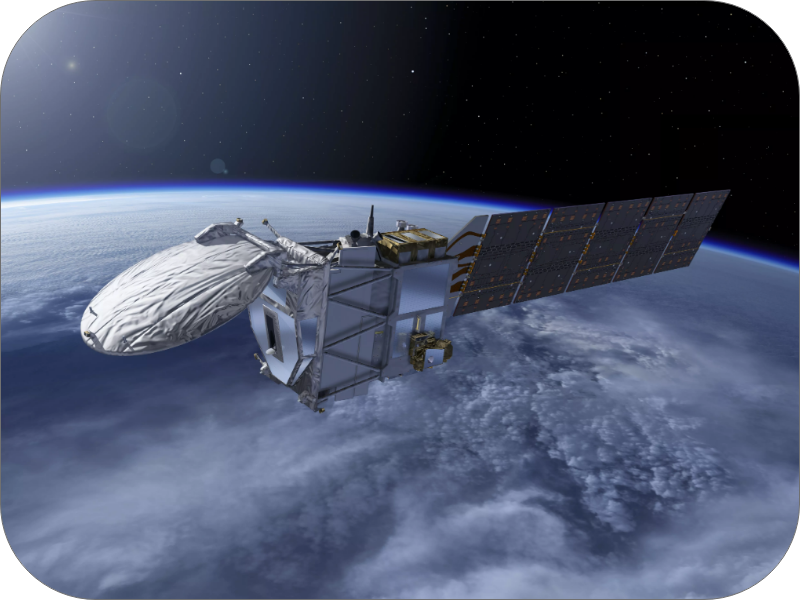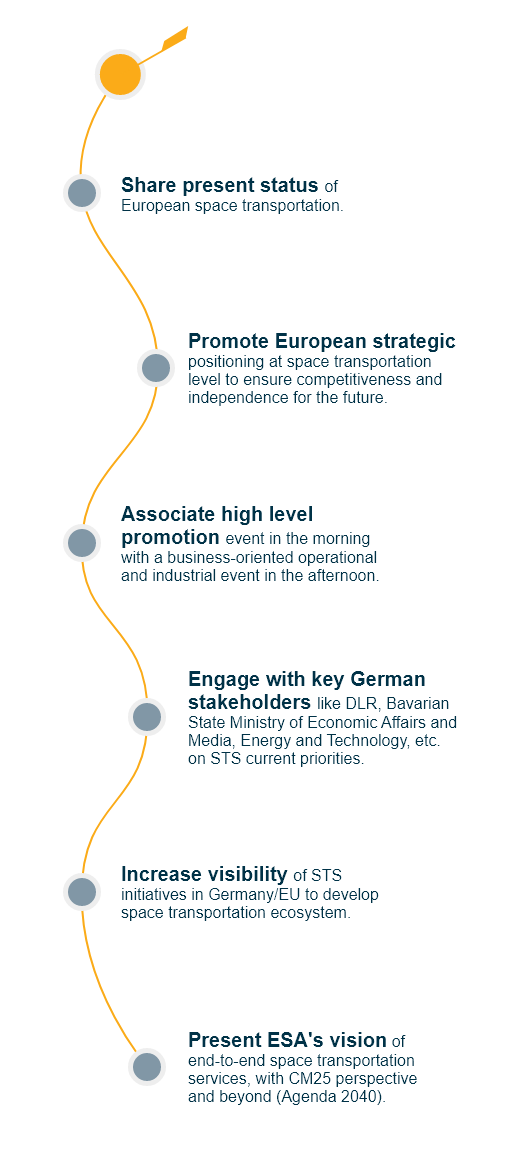About
Current space transportation scenario is disclosing exciting opportunities worldwide. Europe is prepared to face with both competition and opportunities rising on several levels: access to space, in orbit servicing, space operations and re entry missions. Preparation for future European end-to-end Space Transportation capabilities requires diversified strategies to ensure Europe’s autonomy in Space access and beyond. By leveraging partnerships with industry, academia, and cross-border collaborations, Europe can accelerate the pace of innovation, drive economic growth, and strengthen its position in Space.
Germany in general and Bavaria in particular, play a key role in the European Space Transportation ecosystem due to its strong technological background and robust industrial capacity. With significant financial contributions, innovative research initiatives, and active cross-border partnerships, Germany drives advancements in Space Transportation capabilities. However, a more active involvement of German New Space companies and SMEs, shall add more dynamism, agility and entrepreneurial approaches to the ecosystem, further accelerating technological innovation and fostering overall competitiveness.
The Space Transportation Ecosystem conference has a primary objective to foster the continued growth of the ecosystem. This event will cover two complementary moments:
- High level presentation/exchanges in the morning addressing space transportation topics, and
- Content-rich business-oriented sessions in the afternoon to encompass technologies addressing the full spectrum of space transportation needs.

Partner

European Space Agency (ESA)
ESAs ambition is to make Europe a space commercialisation hub to launch and grow global space companies that make sense for our future.
At ESA, one of their top priorities is to help companies seize opportunities to benefit society and gain commercially from space — with the particular ambition of creating a greener and more digital Europe.
ESAs vision is to make the continent a space commercialisation hub, where innovative ideas can grow into world-beating space companies that bring benefits to people across the planet.
ESAs Commercialisation team is on hand to help space entrepreneurs in their journey from idea generation to business success.

AZO - Space of Innovation
AZO is a renowned innovation and consulting company headquartered at the AirTechCampus Oberpfaffenhofen near Munich, Germany. With a specialization in managing international space innovation networks and business incubation and acceleration programs on behalf of the European Space Agency, AZO holds a pivotal role in advancing space technology and entrepreneurship for the past 20 years.
Operating one of Europe’s leading space entrepreneurship centers, the ESA Business Incubation Centre (BIC) Bavaria, AZO supports the business development of startups in the space up- and downstream sectors. Their comprehensive services have led to the creation of over 250 startups and supported investments totaling 2.5 billion euros.
In addition to these achievements, AZO boasts expertise in space transportation. They have provided support to several space transportation companies, including Isar Aerospace and The Exploration Company, through programs like the ESA BIC Bavaria. Furthermore, AZO organizes the Next Stage 2 Space program on behalf of ESA and in cooperation with Ariane Group and MT Aerospace, aimed at fostering cooperation between SMEs, startups, and large-scale integrators in the space industry in Germany.


Bavarian Ministry of Economic Affairs, Regional Development and Energy
The Bavarian Ministry of Economic Affairs, Regional Development and Energy works in myriad ways to consolidate both the competitiveness of Bavaria as a business location and the efficiency of Bavarian companies. That is why we promote innovation, support company founders, and enable the creation of attractive employment opportunities. In this way we generate prosperity for everyone in our federal state.
In our extensive area of responsibility, we promote optimum framework conditions for companies and citizens in the Free State of Bavaria at all times. In this, we focus on the policy fields of economic policy, technological policy, digital policy and energy policy.
The guiding principle in our regulatory policies remains the social market economy. It brings together competitive efficiency with social justice and is therefore the guarantor of our success.

The German Space Agency at DLR
The German Space Agency, undertakes statutory tasks in the space sector on behalf of the German Federal Government. Under the ‘Raumfahrtaufgabenübertragungsgesetz’ and within the scope of the tasks effectively assigned to them, they implement the space strategy of the Federal Government, develop and manage the national space programme and represent the interests of the Federal Republic of Germany in space-related international bodies in accordance with the tasks assigned to them. They advise the Federal Government and develop initiatives and strategic approaches for space policy. All of their activities are based on the guidelines laid down by the Federal Government in its space strategy.
With their missions and projects, they strengthen Germany’s scientific excellence and expand the technological expertise and global competitiveness of German industry. Promoting the commercialisation of space technologies, the innovation potential of German SMEs and technology transfer are essential tasks of their industrial policy mandate. Space technologies and applications are intended to benefit people on Earth and improve the quality of life in Germany, Europe and the rest of the world.
Their space missions make a significant contribution to solving global and societal challenges. Examples include providing information on climate change and climate protection, the further development of digitalisation and communications technologies, and contributions to national security.
They make the results of their missions and projects publicly available. They inform the public about new scientific findings and promote awareness of the relevance of space for everyday life. Last but not least, they strive to spark interest and enthusiasm among young people for the natural sciences in general and space in particular.


